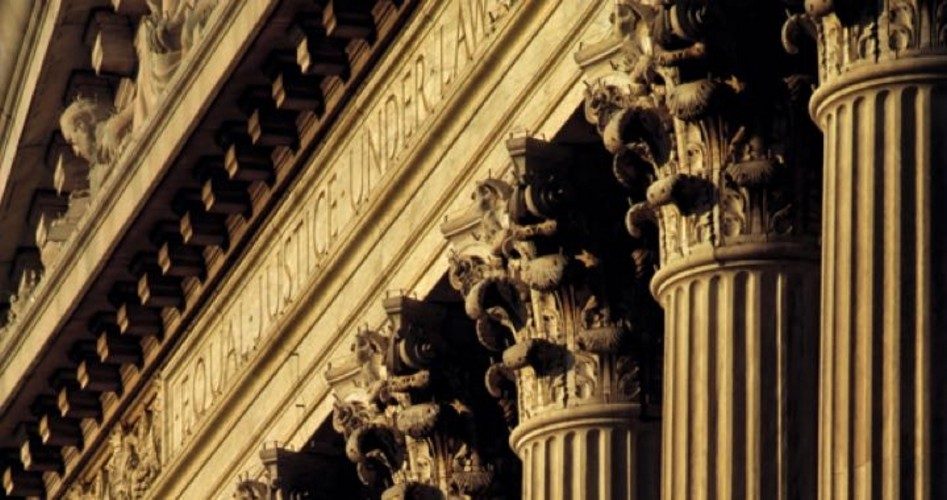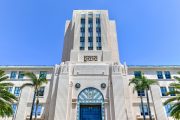
Supreme Court Associate Justice Anthony Kennedy issued an order on September 11 that stayed a September 7 ruling by the U.S. Appeals Court for the Ninth Circuit that said that the Trump administration can’t ban grandparents and other family members of citizens and legal residents from coming to the United States from six mainly Muslim countries with a strong terrorist presence.
In response to the Ninth Circuit Court’s ruling the Trump Justice Department stated: “The Supreme Court has stepped in to correct these lower courts before, and we will now return to the Supreme Court to vindicate the Executive Branch’s duty to protect the Nation.”
The DOJ did exactly that, and Kennedy responded in favor of the administration with his order. His order puts the Ninth Circuit Court ruling on hold until lawyers opposing the travel ban can file their response to the administration’s motion by noon on September 12.
Kennedy’s order is but the latest development in the see-saw legal battle over President Trump’s March 6 executive order that banned travel to the United States by foreign nationals from six countries identified as being state sponsors of terrorism. Just hours before an amended version of the ban was scheduled to take effect, Judge Derrick K. Watson of the Federal District Court in Honolulu granted a temporary restraining order enjoining the Trump administration executive branch from enforcing or implementing two key sections of the order across the nation.
However, on the last day of its 2016-2017 term on June 26, the Supreme Court granted most of the Trump administration’s emergency request to put the president’s March 6 travel ban executive order into place.
Never one to be deterred, on July 13 Watson imposed his own interpretation of the Supreme Court’s June 26 ruling, which had exempted only one category of foreigners from the travel ban, those “with a credible claim of a bona fide relationship with a person or entity in the United States.”
The court left “bona fide relationship” open to interpretation. The Trump administration interpreted that exemption as applying only to immediate family members such as a parent, spouse, fiancé, son, daughter, son-in-law, daughter-in-law, or sibling. However, Watson decided to expand the exemption considerably, to include grandparents, grandchildren, brothers-in-law, sisters-in-law, aunts, uncles, nieces, nephews, and cousins of people already in this country.
The Trump administration asked the Supreme Court to clarify what it meant in its June 26 ruling, but on July 19, the High Court denied that request. However, the court went on to state: “The District Court order modifying the preliminary injunction with respect to refugees covered by a formal assurance is stayed pending resolution of the Government’s appeal to the Court of Appeals for the Ninth Circuit.” By sending the case back to the Ninth Circuit Court of Appeals for further consideration, the justices set the stage for last week’s ruling.
As we noted above, the Appeals Court for the Ninth Circuit said on September 7 that the Trump administration cannot ban grandparents and other family members of citizens and legal residents from coming to the United States from the six countries named in Trump’s March 6 executive order. The countries are Iran, Libya, Somalia, Sudan, Syria, and Yemen.
Which brings us to the latest round in the battle, Kennedy’s September 11 order. Kennedy’s order puts the lower court ruling on hold until the High Court decides whether to grant the administration’s request for a longer-term order. As noted previously, Kennedy ordered those opposing the administration to file court papers by noon on September 12, but what is not known is whether the High Court will take any further action before the court hears arguments on the case during its next session, which will begin on October 10.
The objection to Trump’s travel ban most frequently cited by Watson and U.S. District Judge Theodore D. Chuang in Maryland (the other judge who issued a ruling last March blocking sections of Trump’s executive order) was that the order amounted to a ban on Muslims entering the United States. The judges made numerous references to Trump’s alleged anti-Muslim bias in their respective decisions to block the order.
This alleged anti-Muslim bias was also cited by other judges and the mass media in response to Trump’s original executive order on January 27. The critics of Trump’s 90-day ban on entry into the United States from seven predominantly Muslim countries — Iraq, Libya, Somalia, Sudan, Syria, Yemen, and Iran — did not mention that that particular group of countries originates with H.R. 158, the Visa Waiver Program Improvement and Terrorist Travel Prevention Act of 2015, signed into law by former President Obama on December 18, 2015, as part of the Omnibus Appropriations Act of FY2016.
The portion of the U.S. Code cited in the Trump order was, therefore, created by the Obama-signed law.
On the afternoon of January 29, Trump issued a statement defending his order as necessary to protect our nation from terrorists and denying that it was aimed exclusively at Muslims. He said, in part:
America is a proud nation of immigrants and we will continue to show compassion to those fleeing oppression, but we will do so while protecting our own citizens and border…. We will keep it free and keep it safe, as the media knows, but refuses to say. My policy is similar to what President Obama did in 2011 when he banned visas for refugees from Iraq for six months. The seven countries named in the Executive Order are the same countries previously identified by the Obama administration as sources of terror. To be clear, this is not a Muslim ban, as the media is falsely reporting. This is not about religion — this is about terror and keeping our country safe. There are over 40 different countries worldwide that are majority Muslim that are not affected by this order
The matter will be ultimately decided when the Supreme Court hears arguments on the merits of the executive order in October. However, unless Trump renews the 90-day order, it will have expired by then and the court could consider the case moot.
Photo of Supreme Court: Clipart.com
Related articles:
Hawaii’s Judge Watson Loosens Trump Travel Ban
Supreme Court Allows Most of Trump Travel Ban to Proceed, Will Hear Case in Fall
Ninth Circuit Court Rules Against Travel Ban, but Trump Fires Back
Trump’s DOJ Submitted “Watered Down” Version of His Travel Ban to Supreme Court
Trump Administration Asks SCOTUS to Rule on “Travel Ban”
9th Circuit Court Considers Appeal of Judge’s Order Against Trump Travel Ban
Federal Judge Upholds Trump Travel Ban Blocked by Other Courts
Federal Judges Again Block Trump Travel Ban From Nations With Terrorist Ties
Trump Signs New Immigration Executive Order
Judge Grants Stay to Bar Trump DHS From Deporting Aliens From Seven Nations of Concern
Trump’s Order Suspending Refugee Program: Racism or Balanced National Security?
Trump Executive Order to Ban Nationals of “Countries of Particular Concern”



